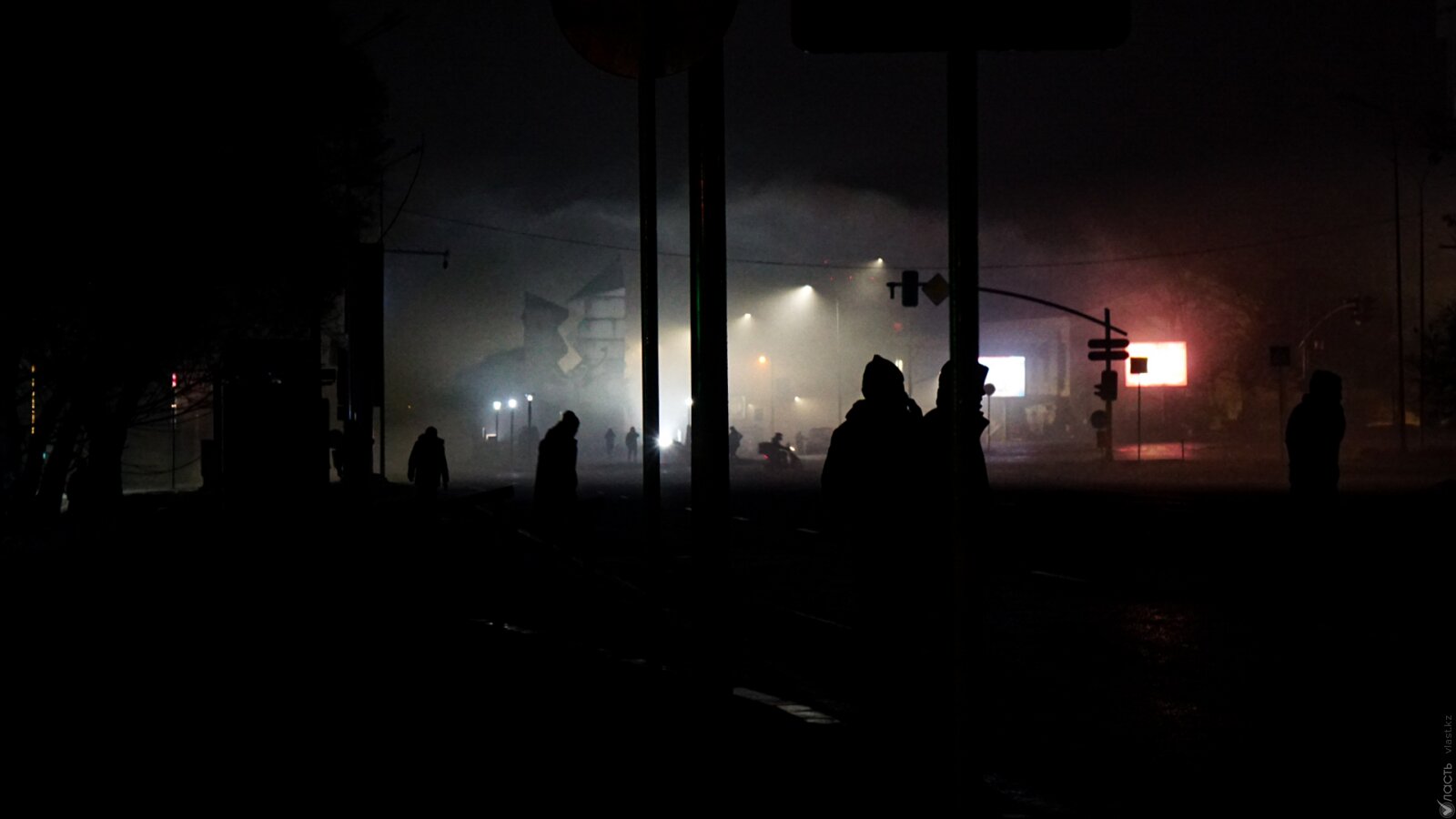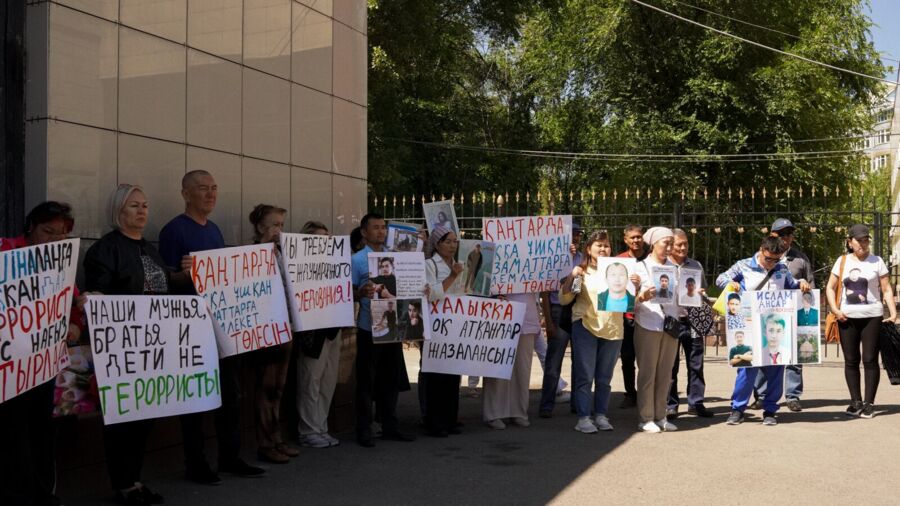A court of appeal in the southern city of Shymkent upheld the sentence against three participants in the unrest in January that swept across Kazakhstan. A brawl ensued, as a group of protesters loudly disagreed with the judge’s reading of the sentence.
Every week, news about trials and court decisions mushroom in various cities, a testament to the widespread nature of the protests and clashes that encompassed the country.
The course of the trials seems scattered and uncoordinated, also because the government has yet to publish the results of the official investigation regarding the tragic events, during which at least 238 people were killed.
The Trials after January
Qandy Qantar (Kazakh for “Bloody January”) was the result of urban violence that erupted once peaceful protests against injustice and inequality spread across the country. Almaty became the epicenter of the violence, as most of the victims resulted from clashes between police, army, protesters, and provocateurs in the country’s so-called 'southern capital'.
What happened in Kazakhstan in the first half of January has acquired several names, from the more neutral "January Events" used by media and public figures to highlight the unpredictable nature of the escalation of the violence, to President Kassym-Jomart Tokayev’s “Tragic January” which shifts the focus to the external nature of the provocation, to Qandy Qantar, a term that activists and victims have coined to symbolize the reality of the violence both from state bodies and from the provocateurs.
As soon as the government lifted the curfew and soldiers stopped patrolling every corner of Almaty, journalists and human rights defenders were able to speak to the families of some of the victims. Vlast journalists collected their stories.
Only in August, the government published an official list of 238 people who were killed or died as a result of the clashes during the January events. Days earlier, a group of parents of children and young men victims of January’s most violent days marched to the capital from the southern city of Taraz, hundreds of kilometers away, to protest their posthumous sentences.
Thousands were arrested as a result of the protests, the riots, and the looting. The first sentences against the alleged participants had already been served in February, as the dust settled in Almaty.
In May, three dozen people were sentenced for robbery, while several others received longer sentences for stealing weapons from the army and police.
In June, a court in Taraz sentenced eight people for taking part in riots that, according to the prosecutor, involved around 500 people shelling the local administrative building. Other residents of Taraz received milder sentences in August.
In Pavlodar, to the north, half a dozen residents were sentenced for organizing or taking part in the riots outside the city’s government building.
Sanzhar Adilov, of the ministry of internal affairs, gave a partial account of the legal proceedings against the participants in the riots across the country in August, saying that 609 had been tried and hundreds more were in pre-trial detention.
State Torture
Of the thousands that were arrested in connection with the protests and the clashes in January, hundreds were subjected to torture while in detention, according to human rights watchdog International Partnership for Human Rights.
The government acknowledged wrongdoing and said it would prosecute the perpetrators among its police force. In June, the Prosecutor General said that six people were tortured to death after their arrest, leading to the detention of one policeman and eight officers of the national security committee (KNB).
Officials repeatedly declare that the justice system is pointing the spotlight on the various instances of torture in January, but the victims disagree.
“Terrible instances of torture took place. I personally identified eight people, but nothing happened ... We, the victims of torture, are under constant surveillance, as if we were murderers and terrorists. But we didn't do anything,” said Akylzhan Kisymbaev, who was detained after being injured by a gunshot as he was working as a welder at a construction site, in an interview with Vlast.
A report by Human Rights Watch denounced widespread arbitrary detentions and mishandling of detainees on February 1.
In an op-ed for Foreign Policy, Central Asian academics Botakoz Kassymbekova and Erica Marat wrote that the use of force by the government was disproportionate.
“Tokayev’s government has struggled to present a convincing justification for using lethal force and torture against protesters,” Kassymbekova and Marat argued, adding that the initial rationale that 20,000 foreign-trained terrorists had taken Kazakhstan by storm was not credible.
Tokayev later blamed a rogue section of the KNB for spreading misleading information.
State Transparency
In his September 1 address to the nation, Tokayev said he decided to grant a one-time amnesty to those involved in petty crime and non-violent violations during the riots and the following curfew. Tokayev acknowledged that several of them had repented and were unlikely to re-offend.
“I think they deserve a second chance. That is why I have decided to conduct a one-time amnesty,” he said. The General Prosecutor’s office later failed to clarify the number of potential beneficiaries of said amnesty.
Still, the people of Kazakhstan await the results of the official investigation on Qandy Qantar.
Already in February, Tokayev said the government would not hide anything from the public. In his March 16 address to the nation, Tokayev promised to publish a list of the victims, but failed to set a final deadline for a fully-transparent investigation on the matter.
Despite loud calls for independent investigations from civil society organizations, Tokayev refused to allow foreign and independent experts to conduct research and cross-check the findings.
Interviewed by Vlast, Dariga Dautaliyeva, the sister of one of Qandy Qantar’s victims, asked: “They say that ‘New Kazakhstan’ is a fair Kazakhstan. But how can there be justice if there is no justice in our case? What is this chaos? There are dead people. There are weapons. There are bullets. There are people who shot those bullets. Why can't they prove anything? Why are they dragging on the investigation?”
Answers are missing, according to human rights defenders, families of the victims, and local residents.
Поддержите журналистику, которой доверяют.









